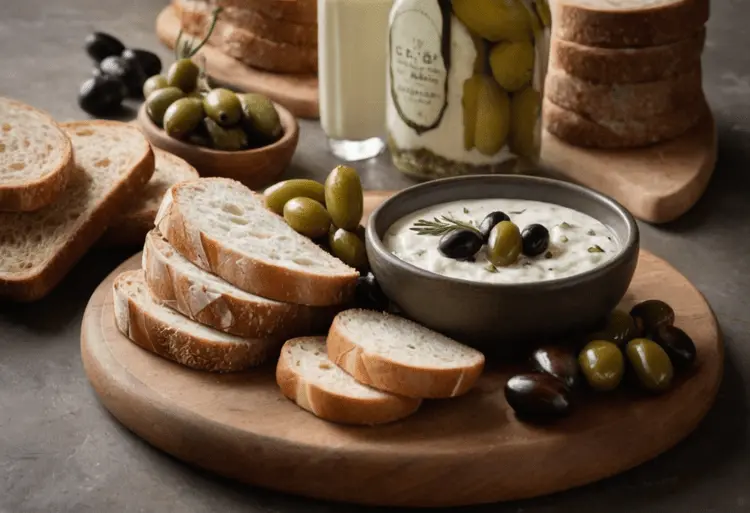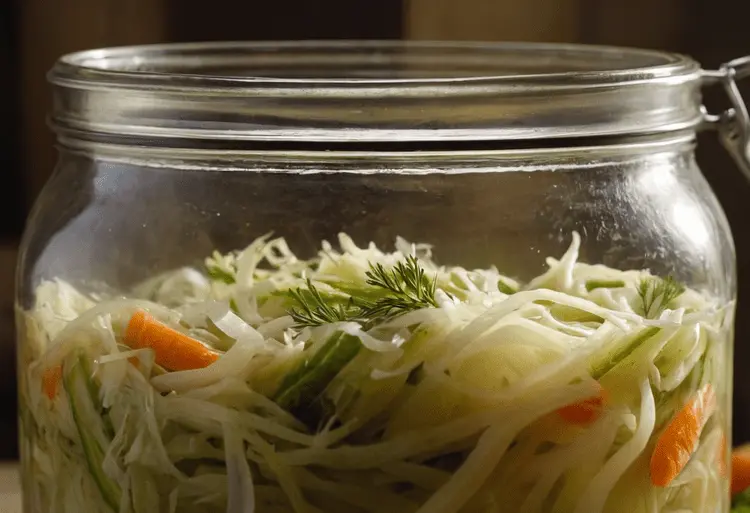Fermented foods might be the missing piece in your health and flavor puzzle. Feeling sluggish? Struggling with digestive issues or a lackluster palate?
The culprit could be an unhappy gut and a diet lacking in flavorful, nourishing foods.
Enter the exciting world of fermented foods! These delicious options are packed with gut-friendly probiotics, support a healthy digestive system, and burst with unique flavors. From tangy yogurt and kimchi to refreshing fermented drinks and DIY fermented foods, there’s something for everyone.
Fermented Foods: The Bottom Line
- Microbes transform food components
- Potential gut health improvement
- Tasty and easy to incorporate
- Diverse global flavors
- DIY recipes available
- Learn about safety and myths
Table of contents
Introduction

Have you ever wondered how tangy yogurt, bubbly kombucha, or flavorful aged cheeses come to be? The answer lies in the amazing power of fermentation! It’s an ancient process that transforms ordinary foods into something extraordinary.
Think about it: how does cabbage turn into zesty sauerkraut? Or soybeans into savory miso? Fermentation is the answer. Tiny microbes like bacteria and yeast work their magic, breaking down sugars and starches to create unique flavors and textures.
But is fermentation simply a culinary trick? Absolutely not! Fermented foods are nutritional powerhouses packed with:
- Beneficial bacteria (probiotics) that support a healthy gut
- Digestive enzymes that aid in breaking down food
- Vitamins and minerals made more easily absorbed by your body
Plus, there’s growing evidence that fermented foods might help boost your immune system and even improve your mood. Intrigued? Let’s dive deeper into the world of fermented foods! Explore safe food preservation techniques through the wisdom and resources available from The National Center for Home Food Preservation.
Are you eager to try fermented food but unsure where to start? Don’t worry, I’ll guide you through the exciting options.
So want a glimpse into the nutritional wisdom of traditional diets? Explore how The Weston A. Price Foundation shines a light on the benefits of fermented foods.
Get ready to discover the delicious and health-boosting benefits of fermentation. If you have questions or tried a new fermented food, so share your experience below in the comments or tag me on social media!
Loved learning about fermented foods? Take the next step for delicious gut-healing power with my Ultimate Guide to Gut Health Recipes! Discover flavorful dishes that will nourish your body and tastebuds.
The Basics of Fermentation
What Are Fermented Foods?
Think of your favorite tangy yogurt, a piece of sharp cheese, or the bubbly fizz of kombucha. What do they have in common? They’re all delicious examples of fermented foods!
But what exactly is fermentation? It’s a process where tiny microbes like bacteria and yeast transform food in amazing ways. They break down sugars and starches, creating new flavors, textures, and even boosting nutritional value.
The Science of Fermentation
Fermentation might sound mysterious, but it’s simpler than you think. This natural process relies on beneficial bacteria, particularly a group called lactic acid bacteria. These little helpers preserve food, add a delightful tang, and can pack a powerful punch of beneficial probiotics for your gut health.
Want a deeper dive into the science behind it all? Check out how reliable resources like the National Center for Home Food Preservation: https://nchfp.uga.edu/ explain safe food preservation techniques, including fermentation.
Proven Health Benefits of Fermented Foods
Fermented food aren’t just tasty – research shows they offer some impressive health perks. Here’s what they can do for you:
- Improved digestion: The good bacteria in those foods support a healthy gut environment.
- Better nutrient absorption: Fermentation can make vitamins and minerals more easily absorbed by your body.
- Immune system boost: Your gut plays a vital role in immunity, and fermented foods can give it a helping hand.
- Reduced Inflammation: Studies suggest a diet rich in those foods may help lower inflammation, which is linked to many chronic health issues.
Fermented foods are an exciting frontier in health research, with emerging studies hinting at potential benefits for mental well-being and healthier weight management.
Enjoying the Bounty of Fermented Foods

How To Incorporate Fermented Foods Into Your Diet
Ready to try fermented food? Awesome! Start small. A little kimchi here, a dollop of yogurt there – it doesn’t take much to start reaping those gut-happy benefits. If you’re new to this world of flavor, gradually increase your portions to let your digestive system adjust.
Think beyond just eating them solo. Those foods can be amazing flavor-boosters! Can you imagine a sandwich without pickles? Or a salad without a sprinkle of tangy feta? Adding fermented goodness is a simple way to elevate your everyday meals.
Tasty & Accessible Fermented Foods List
Don’t know where to begin? The world of fermented food is vast and delicious! Here are some ideas to get your tastebuds tingling:
- Yogurt: Creamy and versatile
- Sauerkraut: Classic and crunchy
- Miso: Savory and rich (perfect for soups)
- Tempeh: Protein-packed and hearty
- Kimchi: Spicy and addictive
- Kombucha: A refreshing fizzy drink
Many of these are easy to find in your regular supermarket. But why not explore your local international food markets for even more options? Fermented treasures await!
DIY Fermented Foods: Easy Recipes to Try
Feeling adventurous? Making your own foods is surprisingly easy and incredibly rewarding! Here are a couple of recipes to get you started:
- Quick Pickled Vegetables: Try [safe food preservation techniques] from The National Center for Home Food Preservation – you can have tasty pickles in no time!
- Simple Homemade Yogurt: Learn the basics and experiment with flavors using resources like [traditional foods] from The Weston A. Price Foundation.
Safety is key, so always reference reliable sources if you’re diving into DIY ferments. And bonus: bragging rights when you impress your friends with your homemade creations!
Fermentation’s Impact
The Cultural Significance of Fermented Foods
Think about your favorite traditional dish. Is there a chance it involves fermented foods? From tangy German sauerkraut to the fiery kick of Korean kimchi, fermented foods have shaped cuisines and cultures around the world for centuries.
But why does this matter? Understanding the cultural connection to those foods helps us appreciate their enduring importance. These dishes weren’t just about survival – they were (and are!) about flavor, tradition, and a deep connection to the natural world.
Furthermore, those foods historically played a crucial role in food preservation. Before refrigeration, fermentation extended the lifespan of perishable ingredients, allowing communities to thrive. It’s a testament to the ingenuity of our ancestors!
Fermented Foods for Specific Health Concerns
Can fermented foods do more than just tickle your taste buds? Emerging research suggests they might offer specific health benefits for certain individuals. While further studies are needed, there’s potential for:
- Improved gut health: Thanks to probiotics and prebiotics in fermented foods (see a trusted resource on traditional foods for more details).
- Reduced inflammation: Some foods may have anti-inflammatory effects.
- Boosted allergy tolerance: Early research hints at a possible link, but more investigation is needed.
Is there a fermented food that could help with a particular health concern you have? It’s always best to consult your doctor, but exploring the research can be empowering.
Important note: Fermented foods shouldn’t replace prescribed medications or treatments. Think of them as a potential complementary boost to your overall health plan.
Expanding the World of Fermentation

Beyond Food: Other Uses of Fermentation
Think of those foods are just about what’s on your plate? Think again! The power of fermentation reaches far beyond the kitchen. Let’s explore some surprising ways this ancient process shapes our world.
- Fashion and Fabrics: Did you know leather can be made through fermentation? It’s true! Bacterial fermentation helps transform animal hides into supple, durable leather goods. And that’s not all – scientists are even exploring how to create sustainable textiles from fermented materials.
- Fueling Progress: Fermentation holds the key to creating biofuels. By fermenting plant matter, we can produce cleaner-burning alternatives to fossil fuels. Is a greener future powered by fermented food? The possibilities are exciting!
- Waste Not, Want Not: Fermentation is a powerful tool for addressing food waste. Overripe fruits and vegetables can be transformed into tasty products rather than ending up in landfill. Plus, fermenting food scraps creates valuable compost for our gardens. Talk about a win-win!
- Healing Power: The science of fermentation is still evolving, and who knows what breakthroughs lie ahead? Researchers are exploring the potential of fermented products in medicine and disease prevention. Could the humble microbes in our fermented food hold secrets to future therapies?
Resources for Fermented Food Enthusiasts
Hungry to learn more? Here are some fantastic resources to deepen your fermented foods journey:
- The National Center for Home Food Preservation: Essential resource for safe, science-based practices when fermenting at home. Their expertise ensures tasty and reliable results. [Include external link #1 with anchor text: safe food preservation techniques]
- Gut Microbiota for Health: Stay on the cutting edge of gut health research and learn how fermented food can support your microbiome. Their website is a treasure-trove of reliable, science-backed information. [Include external link #3 with anchor text: gut microbiome science]
Let’s keep the conversation flowing! Have you tried using fermentation in unexpected ways? Share your experiences in the comments below or tag us on social media – we’d love to hear from you!
Fermented foods give you a probiotic boost, but did you know there are many different strains? Discover which probiotics might be right for you and how to maximize their benefits in my article, ‘Probiotics for Gut Health‘
FAQs and Beyond
Frequently Asked Questions (FAQs) About Fermented Foods
Got questions about fermented foods? You’re not alone! Let’s dive into some common ones:
Popular fermented foods include yogurt, kimchi, sauerkraut, miso, tempeh, sourdough bread, and kombucha. There’s a whole world to explore!
Research shows fermented foods can benefit digestion, the immune system, and may even help with things like inflammation and nutrient absorption.
Every culture has its own! Examples include sauerkraut (Europe), kimchi (Korea), natto (Japan), and fermented milk products like kefir (Eastern Europe).
Start with small servings (a few tablespoons) of one or two fermented foods per day. You can gradually increase as your body adjusts.
Generally yes, but those with compromised immune systems or severe digestive issues should consult their doctor first.
Start slow! Overdoing it might lead to temporary gas or bloating. Gradually increase your portions as you get used to them.
Follow the directions on the product label or recipe. Many need refrigeration to slow down the fermentation process.
Not all fermented foods contain live probiotics. Look for terms like “live and active cultures” to be sure.
Debunking Myths About Fermented Food
Let’s clear up some fermented food confusion!
- Myth: Fermented foods are dangerous. Fact: When done properly, fermentation is a safe, age-old preservation method. Get reliable guidance from resources like the National Center for Home Food Preservation if you’re making your own.
- Myth: All fermented food taste sour and funky. Fact: There’s a whole world of flavors out there! From tangy yogurt to earthy miso, fermented food offer amazing variety.
- Myth: Fermented foods are just a fad. Fact: Humans have been fermenting foods for centuries! This wisdom is seeing a well-deserved revival.
Got more questions about fermented food? Let me know in the comments below! Or tag me on social media – I’d love to hear how you’re enjoying them.